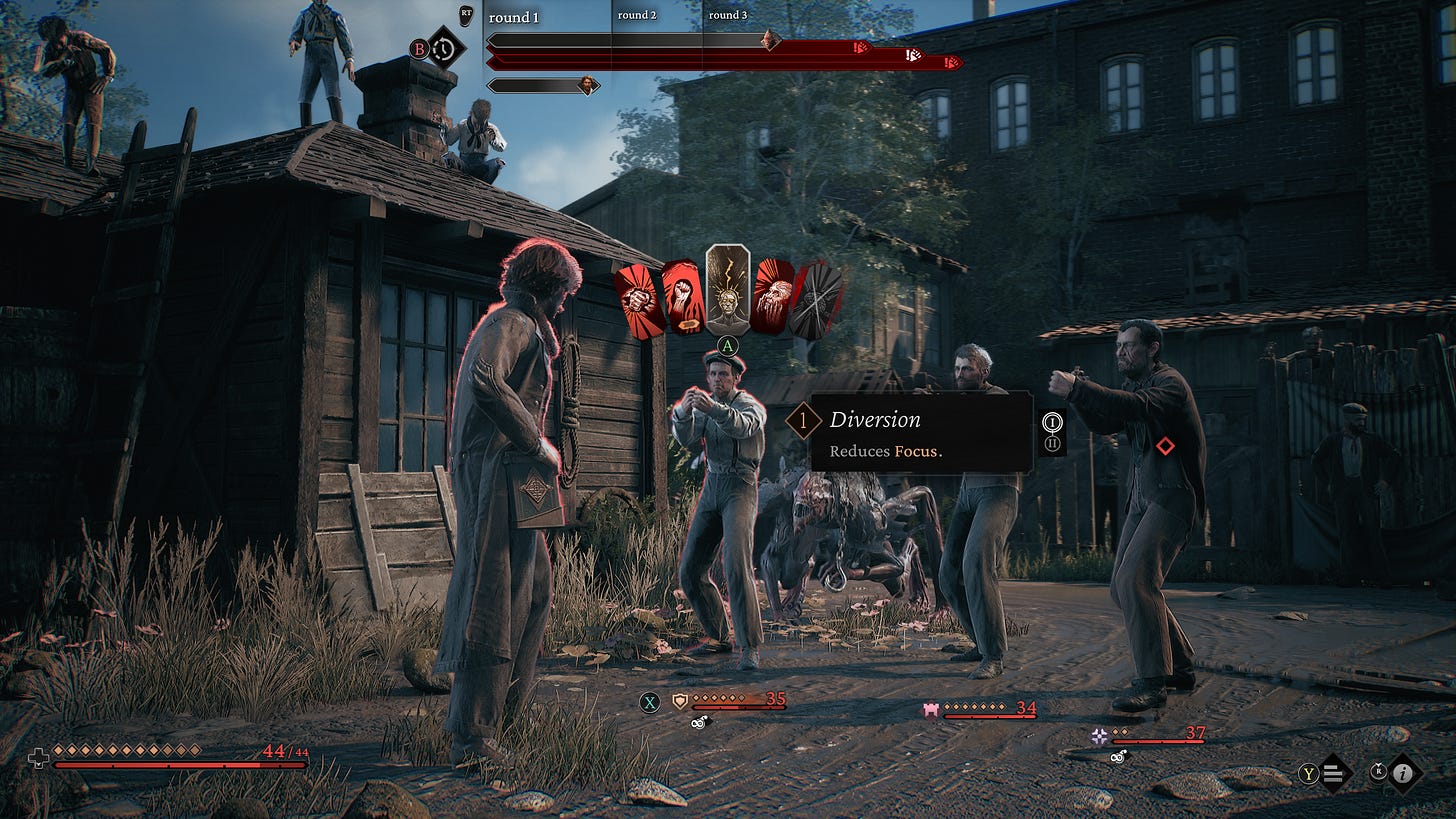The Thaumaturge rides high on the wave of cosy RPGs
The game by Fool's Theory launched in March on PC, and is now available on PlayStation and Xbox
Review: The Thaumaturge
Developed by Fool's Theory and published by 11 Bit Studios.
Rating: ★★★★★★★☆☆☆
Apparently, the name means ‘a worker of wonders’ and ‘performer of miracles’. It was something I learned only after the opening text of the game had flashed on screen. Sure, it’s an apt descriptor for the game’s protagonist and others of his ilk, but I also found myself leaning towards tagging this whole genre of ‘non-traditional RPGs’ with the same epithet: A worker of wonders. Luminaries in the field include such titles as Disco Elysium, Sovereign Syndicate and even Pentiment to an extent. And while I plan to jump right into The Thaumaturge, I will return to this point in a little while.
Set a little while after the turn of the 19th Century in Russian-occupied Warsaw, the game is equal parts historical fiction and the supernatural. You play Wiktor Szulski, a detective and (you guessed it) thaumaturge, who returns to the city to investigate the mysterious death of his estranged father. This entails roaming around (isometric) environments, searching for and connecting clues, talking to NPCs, fighting with some of them (a turn-based affair) and moving the story along through a handful of key choices.
Over the course of a playthrough that took a little under 20 hours, I was pleasantly surprised by the game, despite an opening that made me quite wary. For starters, the optimisation wasn’t great, the voice acting was distinctly average, and the accents were frankly quite incoherent geographically. These could have potentially killed off a lesser game, but not The Thaumaturge. It had enough personality, quirkiness, serviceable gameplay loops and narrative depth to carry it over the finish line.

Witchcraft
I’d spotted plenty of trailers for the game in the lead-up to its PC launch back in March, and while the concept was interesting, I simply didn’t have the bandwidth to pick it up back then. Given 2024’s relentless onslaught of quality titles, The Thaumaturge had slipped my mind completely until a couple of weeks ago, when the Xbox Series X|S review code dropped into my mailbox. Would the inherently-PC format of point-and-click even work on a console, I wondered. Sure, I’d played Disco Elysium (and had a very good gameplay experience) on PlayStation 5, but I felt that playing Sovereign Syndicate on PC gave me a better handle on traversal and interaction in a game of this nature.
Once I got started with The Thaumaturge, however, all such concerns were quickly swatted aside, because the gameplay is adapted quite well to the console experience. Moving a cursor around with the thumbstick can get very mildly tedious after a long session, but it’s an insignificant quibble. The game’s languid start — that serves not entirely unexpectedly as a mini-tutorial — had me wondering if the game might actually be a bit too slow-paced for my liking. But I needn’t have worried because shortly after, the game was happy to fling me headlong into its grimy, seedy, violent, dangerous and magical world.

As touched upon briefly, our protagonist Wiktor is a thaumaturge — gifted with some magic and the ability to communicating with ghostly apparitions known as salutors. Each of these creatures represents a particular flaw (pride, envy, recklessness and such-like) and the game lets you enhance linked abilities once you capture a salutor. It’s not quite Pokémon, but you do have to go through a protracted turn-based battle to claim them. And once they are yours, you can use their abilities in combat or under normal circumstances (to manipulate someone, for instance)… again, like Pokémon, but not quite. The more of these you collect, the more options you’ll have at your disposal when it’s time to dispatch foes, but it comes with a tradeoff. In order to collect all (or close to all) the salutors, you’ll have to step on a number of toes and make some unfavourable decisions.
And therein lies the draw of The Thaumaturge. Several games throw numerous characters and side quests at you, and in so doing, lull you into a false sense of comfort that your choices and decisions matter. Very often, they don’t. Not a jot. That’s not the case here, where every interaction or decision feels weighty and consequential. As does when you decide to embark on a certain side mission, because it’s possible to be locked out of certain quests or lose favour if you fail to complete a certain task before another. One example of the latter concept is a meeting you are asked to attend. Remember to buy a box of doughnuts before you arrive, and it makes things a lot smoother for you. Fail to do so, and you’ll have to deal with a bit of pushback and reticence. However, the purchase of said doughnuts is never indicated as a critical task to you, and so you are left to your own devices to decide how important a task it is.

Holding your journey together is a riveting story brought to life by some very solid writing. Sure, it can be a tad anachronistic (with weirdly out-of-place phrases popping up every now and then), but one tends to overlook such piffling matters when the overall narrative is so gripping. Social and political upheaval in pre-First World War Warsaw provides the backdrop for an inherently personal tale. It doesn’t help matters that the way of life (and indeed, lives) of thaumaturges across the city is under threat. In the midst of all this is a mysterious resistance group that seeks to topple the oppressive ruling regime. And at the heart of it all is a magician trying to find himself within this crazy world.
This is by no stretch an open-world game. There are around half-a-dozen or so explorable areas, but none of them are particularly large. That said, the ability (and need) to change the time of the day to access particular quests does add a bit of variety to these zones. Additionally, lore is scattered all over in the form of books, notes, letters, newspapers and scraps of paper. While exploration is entirely optional, the game does nudge you in the direction of unearthing these pieces of information by rewarding Experience for every discovery. This, in turn, lets you level up your skills and flaws.

Rich and engaging it certainly was, but additionally, the forking nature of the narrative was such that I constantly found myself making mental notes about what I’d do differently in my next playthrough. At the game’s conclusion, I was glad to note that those particular decisions did shape my journey quite a bit, and so, the replayability factor is definitely high with The Thaumaturge. Between generous slabs of storytelling and world-building comes combat, and I must admit that I found the turn-based fare a bit basic at the start. But once you factor in all the salutors, their powers, the (admittedly small) variety of enemies and how they work in combination with one another (and a host of buffs and debuffs) that things get a lot more interesting. I was pleased to see a gameplay element that started off so ho-hum turn so very compelling by the end.
But — and there’s always a but (always) — there were some blemishes. I won’t belabour the point, but the voice acting was truly dire. And the accents, not only did a lot of them feel out of place, but they leaned rather generously into stereotype rather than making any attempt at linguistics. We’ll move on. Behind the cogent writing and surprisingly complex turn-based combat lurks some frankly shallow detective work: Hitting this game’s equivalent of a scanner looks great visually, but it reduces the whole detection part of the game to running around trying to ping various points of interests until you’ve located enough of them for the game to put evidence together and draw a conclusion. Rinse and repeat.

This is a shame since Wiktor is meant to be a detective, which means he needs to be connecting those clues himself. Several games have made use of evidence boards (with varying levels of detail), and a similar gameplay mechanic here would not have gone amiss. Elsewhere, such technical issues as slow load times, pop-in textures, strange facial animations and a spot of stuttering mar what could have been be a seamless experience. These aren’t game-breaking issues, to be sure. But they do derail what could otherwise have very easily been one of the most accomplished games of the year.
The cosy RPG
I’ve only made my way through a couple of dozen hours or so of Baldur’s Gate 3, around 13 hours of Metaphor: ReFantazio and a shade over 20 hours of Persona 4 Golden. This isn’t because I dislike massive RPGs. Not even remotely. Hell, I kicked off the year with a near-90-hour playthrough (the first of what I imagine will be at least two or three) of Like a Dragon: Infinite Wealth. My affinity for detailed and lore-heavy RPGs with a tonne of gameplay mechanics to learn and characters to befriend isn’t the issue. The amount of time at my disposal, unfortunately, is.

And that’s where these seemingly miraculous, streamlined RPGs (upto 20 hours in duration) like the ones listed at the top of the piece, are a rare treat. Shorn of seemingly non-essential and playtime-extending gameplay elements, these titles feature focussed storytelling with a smattering of RPG elements — whether in the form of levelling up, team-building, customisable loadouts, meaningful choices and decisions, or cosmetics. These games seem to be aware of the fact that their time with you is short, and so can’t afford the slow burn or the gradual buildup of intrigue. There’s plenty of scope for narrative and world-building here, mind you, but it’s all done in a relatively speedier matter.
Then there’s the fact that you don’t have to be a Dungeons & Dragons aficionado or CRPG veteran to get into and enjoy these RPGs. It’s part of the reason they can be defined as ‘cosy RPGs’. An example of this is that you won’t find yourself having to backtrack a long way because you got the wrong combination of team members, strayed into a difficult mission at a low level, or just made some choices you regret. With cosy RPGs, you get an experience with a small handful of guardrails that keep you from painting yourself into a corner. This is invaluable if you don’t necessarily have hundreds of hours to immerse yourself into a world, and would rather be a tourist for a dozen-odd hours.

The Thaumaturge is a luminary of this genre because it balances the depth of a well fleshed-out world with the snappy writing of a short-paced adventure. It uses its relatively small environments well to construct a believable and memorable setting in which you can lose yourself for a few hours, and to which you’d like to return long after the end credits have rolled. And if you can look past some of the hiccups, you’re in for an absorbing adventure.
Game reviewed on Xbox Series X. Review code provided by publisher




